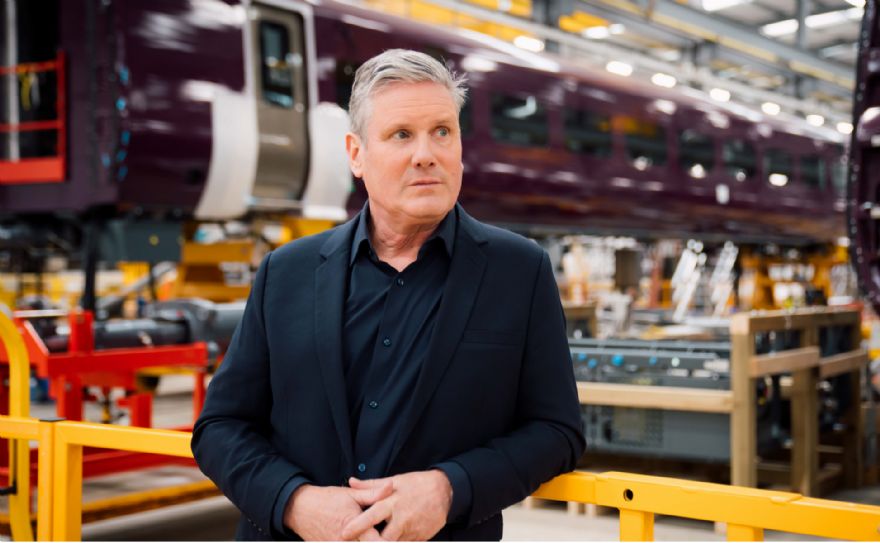 Picture: Labour Party
Picture: Labour PartyManufacturing organisations and businesses up and down the country are today reacting to a historic Labour victory in the General Election which has highlighted the UK’s appetite for something different. The electorate has handed Sir Keir Starmer a clear mandate for change, which industry bodies say will provide a period of relative stability and give businesses the right conditions to plan ahead and invest for the future.
Rain Newton-Smith, CBI chief executive, said: “Congratulations to Sir Keir Starmer and the Labour Party. Delivering sustainable growth should be the defining mission for the new Government. Business stands ready to bring its innovation, ideas, and investment to make that shared mission a reality. The new Prime Minister has been given a clear mandate to take the tough decisions on areas like planning reform and boosting grid capacity needed to get the economy firing on all cylinders. What firms need now is a Government that is ready to hit the ground running and is laser-focused on delivery.
“Households and businesses across the UK have shown incredible resilience through Brexit, Covid-19 and war in Europe. With the economy picking up steam, now is the moment to get behind growth. Setting out a positive vision for the UK economy and leaning into our international leadership should be top priorities for the first 100 days. Building a partnership for prosperity between the Government and business holds the key to unlocking a revitalised pitch to global investors. By working with business, the new Government can deploy the capability and capacity of industry to deliver the connected transitions across net zero, the digital economy, and the future of work needed to put the economy on a pathway to sustainable growth.”
Decisive victoryStephen Phipson, chief executive of Make UK, said: “I congratulate Sir Keir Starmer on leading his party to a decisive victory. Business will welcome such a clear result and an end to the political and economic instability of the last few years which is essential for companies to now bring forward much needed investment. Looking ahead, the new Government has a lot in its in-tray to address.
“First and foremost is the urgent need to kick start the UK’s anaemic growth levels of recent years and, boost investment in our infrastructure, without which we cannot address the many urgent priorities the Country faces at national and regional level. A modern, long-term industrial strategy which tackles the skills crisis in particular will be key to delivering this growth. Manufacturers stand ready to work with the new Government and all stakeholders as a matter of urgency to help deliver this.”

Mike Hawes, SMMT chief executive (pictured left), said: We congratulate Sir Keir Starmer and the Labour Party on their election success. The new Government’s commitment to an industrial strategy and its already published
Automotive Sector Plan can boost manufacturing competitiveness, enhance trade relations and support consumers. The industry is fundamental to the achievement of ‘net zero’ which, with the right conditions, will deliver the growth the economy needs. We now look to continue our productive partnership with government to ensure the long-term success of the sector and all those who depend on it for their mobility, services and livelihoods.”
Stephen Morley, President of the Confederation of British Metalforming (CBM), the leading trade association for UK manufacturers of fasteners, forgings and pressings, cold-rolled and sheet-metal products, said: “We would love to see a long-term Industrial Strategy that plays to the UK strengths and acknowledges the challenges we face. Ideally, we would like to see something that is cross-party or has a Royal Charter that ensures longevity regardless of the political persuasion.
“A dedicated Minister for Manufacturing is a campaign the CBM has added our voice to and could be an early win if Labour wanted to show a willingness to place new importance on a sector that drives innovation, supports GDP and creates high-skilled jobs. There must, however, be a clear recognition of SMEs and a desire to look past the B5 lobbying groups, giving a vital part of the economy the recognition it deserves.
The impact of leaving the European Union continues to bring widespread disruption to UK manufacturing, yet not one party in the lead-up put forward a potential resolution. This is something that Keir Starmer needs to address urgently.
“Furthermore, we urgently need a review of the Apprenticeship Levy and how funding in this pot can be spent. There needs to be more creativity and an ability to allow manufacturers to spend it on different types of technical courses that they specifically need and will create the employees they require. There is also an argument that the current funding structure doesn’t encourage training providers to support Level 2 apprentices, which traditionally is what we call foundation Level. We are all for upskilling, but we are missing an important rung of the engineering ladder.”

Tony Hague, CEO of PP Control & Automation (pictured left), one of the UK’s leading strategic manufacturing outsourcing specialists working with 20 of the world’s largest machine builders, said: “There was no real surprise with today’s election result. Conservatives have paid a heavy price for many years of ineffectiveness, personified by the Liz Truss mini budget that rocked the economy and left many of us still paying the financial price. After 14 years of the same Government, a change was almost inevitable. In truth, the current Labour manifesto is fairly central and balanced, albeit the concern of increased taxes is always there.
“From a UK manufacturing perspective, we await with interest what positive steps they may take in the short and long-term. Some relatively easy decisions that could have a big impact, include a revised R&D policy, a review on Corporation Tax and more sustained support for SMEs around export. Now the election is over, we must see positive and bold action from the Bank of England, and this should start with interest rate cuts to stimulate the economy and reduce the cost of borrowing. Personally, I would welcome some real incentives around the housing market. If we see a strong construction sector, the rest of the economy generally follows.”
Tackling the skills crisisDuncan Keates, managing director of Leicester-based ADS Laser Cutting, said: “As the owner of a manufacturing business, some of the biggest challenges we face are linked to finding suitably trained people to join the team – an issue that has been especially hard post-Brexit, and also following the Covid-19 pandemic. Balancing increased business costs, including capital investments which are essential to remain competitive, with the cost of recruiting and retaining skilled staff is a key priority for us. The new Labour Government must, therefore, use its conclusive win to quickly demonstrate its commitment to investing in training and apprenticeships, and overall jobs creation.
“Its pledge to rebuild the UK’s steel industry is something of particular importance to us, but the devil will be in the detail, and we look forward to seeing Labour’s vow to invest £2.5bn in the sector come to fruition. Not only will this drive stability in steel prices, it will also develop our resilience in the face of geo-political events that have added to the recent challenges faced by the sector here in the UK. The instability of recent years must now be replaced with a long-term industrial strategy so that British businesses have the confidence to make investment decisions that will increase productivity, result in economic growth and enable workers to enjoy more money in their pockets.”

Gareth Jones, managing director of In-Comm Training (pictured left), which provides more than 2,500 apprenticeships and upskilling opportunities across its two technical academies in Aldridge and Telford, said: “To be fair to the Conservatives, they did put apprenticeships back on the map and reignite its credibility among learners, parents and employers. This was no small feat, but now the baton has been passed to Labour to build on this evolution and there have already been some big promises leading up to this election – widening the scope of the Apprenticeship Levy would be a very welcome move for example.
“The future of skills provision will be very interesting under the new Government. In recent years, capital grants and funding have been strategically available for the right projects and the right private sector providers, and this has ensured that access to training is more employer-led, impactful and delivering the skills industry actually requires. This must be maintained, and we can’t go back to the period where money was just given to public-owned universities and colleges.
Going forward, the Labour Party’s manifesto states that it will push decisions on skills spend out of Westminster and into local communities to decide what they require, presumably continuing with the theme of devolution. We would welcome this as long as the funding is open to the best providers and organisations and not ring-fenced for the few.
“Industry requires a long-term strategy to build trust and give companies confidence to invest. To have a strong economy we must be making product - I’ve said it for years, yet many companies are dying with their owners choosing to retire rather than succession planning. We want a strong industrial sector with pathways to jobs for all.”